Fishing has been an activity that humans have practiced which dates back thousands of years. In modern times, it’s become one of the most popular sporting activities in the world as anglers from all over go after various game fish species in their area. There’s nothing quite like the fun and exhilaration of catching a fish on a rod and reel, whether it’s freshwater species like bass, bluegill, or trout, or even a giant variation of sport fish like tuna or marlin.
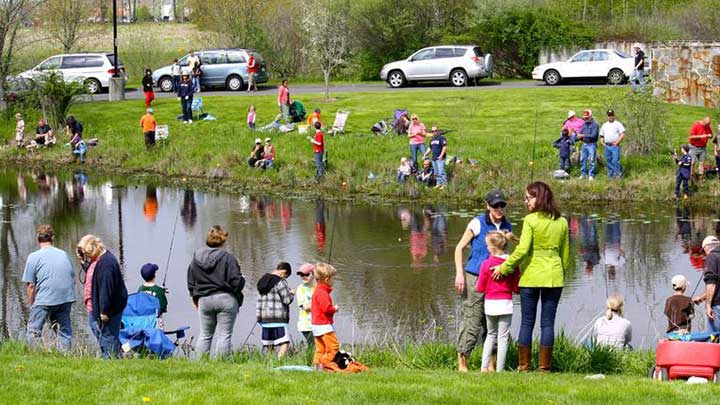
This sport is one that virtually anyone can enjoy, regardless of age or skill level. Fishing is an excellent pastime that allows parents and grandparents to spend quality time with their children and teach them valuable skills in patience, as well as persistence.
If you’re just getting into fishing and aren’t quite sure where to start, there are a number of beginner tips that you’ll need to be aware of in order to make sure you are both safe and successful in your efforts.
Here are Fishing Tips for Beginners
1. Buy a Fishing License
Getting a fishing license is priority number one in your pursuit of the many different game fish species in your area. Each country, region, and state has its own set of rules and regulations on fishing. This will determine which fish you can catch, as well as the different lures and methods you’re allowed to use.
In the United States, each state will have its own variation of limits in regards to the fishing season and how many fish of a given species you’re allowed to keep in one single outing. This is meant to help preserve a stable number of different species of fish so that they don’t become too heavily targeted by anglers.
It’s important that you figure out exactly what kind of licensing you will need to fish for certain species in your area. Failing to do so can result in being hit with hefty fines by law enforcement and wildlife officials. While it may be tempting to skip this step in an effort to save a few bucks, doing so will eventually land you in a bit of legal trouble and might hamper your future efforts to enjoy fishing. Luckily in most states, kids under a certain age generally do not need a fishing lisence.
2. Get the Right Size Rod and Reel
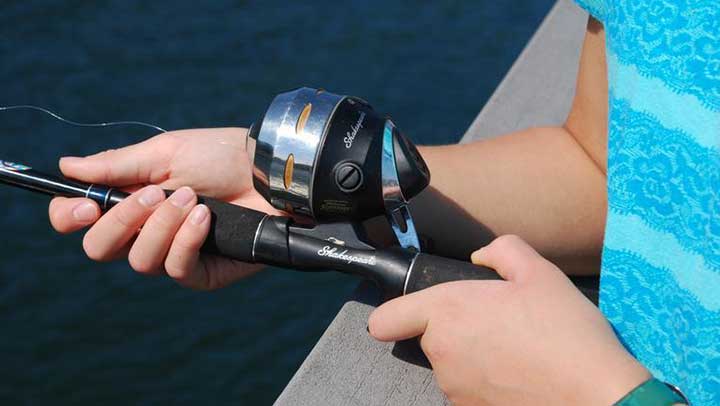
When it comes to finding the right size rod and reel for fishing, there really is no one-size-fits-all approach in most cases. If you’ve visited any bait and tackle shop or even a large sporting goods retailer, you’ll quickly notice that there are endless variations of sizes when in regards to length and thickness of fishing rods, as well as the many different types of reels and a range of sizes.
Knowing more about the type of fish you intend to go after will help in determining just what type of rod and reel you should get, as well as the size. If you plan to fish along the coastline, you’ll want to get a larger rod and reel that’s capable of handling exceptionally large game fish species. Surf fishing is a type of angling that will require a bigger, longer rod in order to allow you to cast out well past the waves and into the more calm water where fish are generally feeding.
Freshwater fishing is a bit different as most of the fish species are somewhat smaller than what you might find in the ocean or along coastal areas. If you plan to fish for largemouth bass, which is the most common freshwater fish species throughout much of the American Heartland, you’ll want to go with a medium-sized rod of up to about 7’ in length. Going after small species like trout will mean using a lighter, shorter rod in most cases.
If you intend to take kids along and let them enjoy the action, it’s a good idea to start them out with a spincast reel and a smaller-sized rod. The spincast reel is very simple to operate and will allow kids to really focus more on catching fish rather than dealing with frustrating equipment.
3. Get the Right Kind of Fishing Line
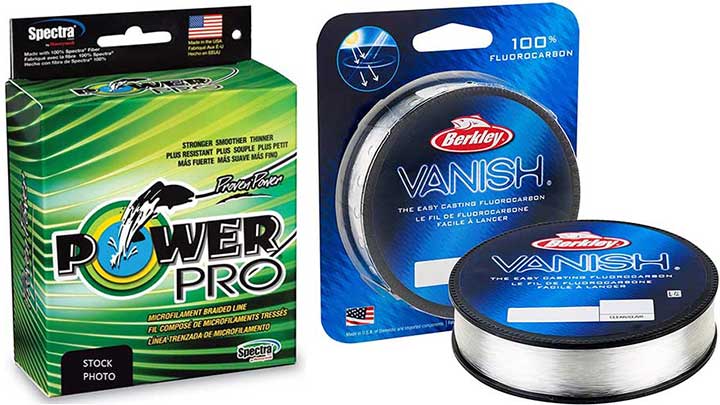
As with anything else when it comes to fishing, you’ll want to match the size of your tackle and other gear items to the size of the fish you intend to catch. If you plan to fish for monstrous game fish found in the ocean, you’ll undoubtedly want to have a very strong fishing line in order to make sure your line doesn’t break. Fishing for small freshwater variations presents an opportunity to use lines rated as light as 4 or 6 pound test.
Knowing the differences in each type of fishing line will also prove to be an advantage as each has its own unique qualities and advantages. Braided fishing line is widely considered to be the strongest of any type of line as it offers a strand that’s literally ‘braided’ together from multiple pieces of material. This type of line is also easy to cast but isn’t recommended in every type of situation because it is more visible to the fish.
If you plan to catch smaller species that reside in rivers and streams, look for a lighter monofilament or fluorocarbon line since this will blend in with the water more and allow you to fish without using a leader.
4. Properly Set Your Drag
Drag is something that is all-too-often overlooked by anglers who are just starting out in the sport. It might seem insignificant, but having your drag set to the proper level will go a long way in making sure you’re able to catch and land the fish you’re going after.
Drag simply refers to the level of resistance your reel will provide against any force being applied to pull the line out of the reel. Reels are designed with force applied to various numbers of plates inside the reel. This helps anglers have greater levels of control over just how much line can be pulled out and how fast.
Setting your drag too low will result in larger fish quickly pulling off way too much fishing line from your reel. This will put you in danger of being unable to land the fish or even letting it strip out so much that it becomes tangled in nearby objects. Having your drag set too high will mean that a fish that pulls hard enough against your line may break off more easily since the line itself is only able to hold so much force.
Determining the right level of drag to set your reel at truly comes down to practice and catching a few fish yourself. Once you’ve hooked a few, you’ll be able to understand the right amount of drag to use for a given species of fish. When you’ve reached a more advanced level, manipulating your drag can be advantageous in using various lure presentations and techniques that will result in bigger catches.
5. Start with Using Fresh Bait on a Bobber
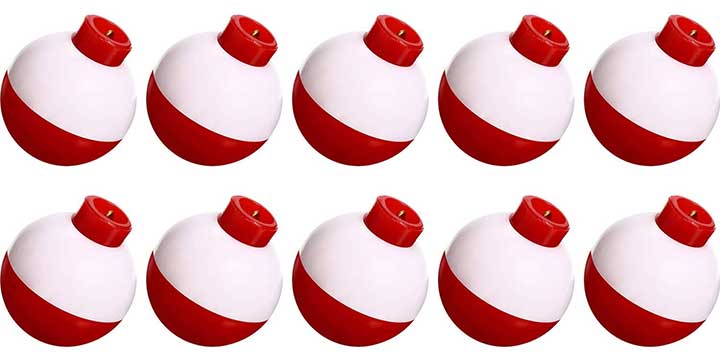
Fishing can seem overly complicated on the surface as there are thousands of different styles of lures, lines, weights, and other items that are used to catch fish. This might be overwhelming to the novice angler and can even turn them away, but it’s best to remember that starting out with a simple presentation of live bait with a bobber is the best approach.
Fish often look for food sources that are familiar to them and using live bait like worms, grubs, crickets, or any other type is always the best way to get started in the sport. Using live bait and bobber only requires a simple hook and an optional sinker to keep the bait in place at a certain depth. Instead of having to retrieve the bait over and over to produce a strike, using live bait allows the angler to cast their line in and simply keep their eyes on the bobber in order to detect a strike.
This approach is considered to be best when getting kids into the sport of fishing as they will be able to pay more attention to the fish than trying to cast and retrieve a lure repeatedly. It’s also the most highly-recommended way of relaxing while fishing as you can kick back and wait for a bite. If you plan to fish for freshwater species, try starting out with any type of worm to catch virtually any freshwater species of fish. If you’re fishing in saltwater, opt for shrimp since this is the most prevalent food source for most saltwater species.
6. Ask Locals for a Good Location
One of the best pieces of advice anyone can get when starting out in the sport of fishing is to ask for advice. Fishing is a sport that requires a great deal of time and energy spent in different trial and error methods to narrow down the best methods of catching any particular type of fish. It’s always a good idea to ask someone who has already gone through this painstaking process for advice as to what kind of lure or bait to use, as well as where to fish.
Most fishing enthusiasts will readily share information that will be helpful to newcomers as they also were once starting out in the sport that so many people love and enjoy. However, don’t expect most skilled anglers to give you any indication on their own specific spots that they consider to be best. It’s common knowledge among fishermen and women that it’s worth the effort to search for and find those unique areas where fish can be caught with relative ease.
If you’re looking for a good place to start asking for advice on how to catch fish in your area, try visiting the local bait and tackle shop as there are usually fellow anglers there who are willing to give you some useful advice.
7. Be Quiet While Fishing
Fishing is a sport that can be very closely compared to hunting in many regards. Anglers must search for the best areas to fish, and try the right combination of bait in order to actually catch their prey. However, one of the most useful tips any beginner can have when starting out in the sport of fishing is to be as quiet as possible at all times.
Fish actually have a very keen sense of hearing that works by sensing vibrations in the water. This sense helps them locate prey which they often feed on, as well as helping them to avoid danger from larger predators.
If you go into an area and make too much noise, don’t be surprised if you don’t get any bites for quite a while as you can very easily spook the fish out of a location before you know it. It’s always best to approach an area with the highest level of stealth possible in order to have the element of surprise in your favor.
8. Fish Early Morning or in the Evening in Freshwater
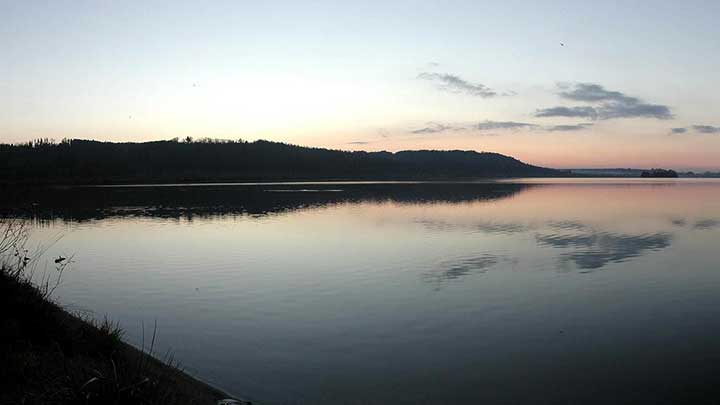
Fishing is a sport that can truly be enjoyed any time of the day or night. Seasoned anglers will often gear up with lights and other equipment to go on an all-night fishing trip, but newcomers should stick to what is most simple, to begin with. If you’re just getting into the sport of fishing, try starting out fishing in the early morning or late evening.
Fishing in the morning or evening presents a number of advantages to anglers. Most predatory game fish will use cover and concealment to their advantage in order to surprise their prey and snag a quick meal. During early morning or late evening, there is usually a decent amount of light that allows fish to see potential prey and sneak up on it using the low level of light to their advantage. For anglers, this means fish are always going to be most active in the early morning or late evening as they look for potential meals.
9. Fish a Changing Tide in Saltwater
Fish are known to use the natural elements to their advantage in order to gain an edge over their prey. When it comes to saltwater fishing, you can usually expect fish to be more active during the times when the tides are changing as smaller baitfish will be pushed back or pulled out into the deeper water, making it easier for game fish to make a meal out of them.
This change in tides occurs based on the sun and moon orientations, not the time of day. Each day there are typically two high tides and two low tides. If the tide is slack and the fish are not biting give it a few hours and your “luck” might change.
10. Wear Polarized Sunglasses
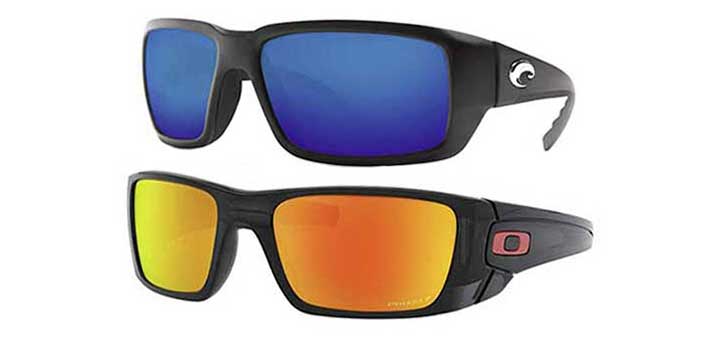
Anglers who have experience in the sport of fishing know how valuable it can be to utilize every piece of gear and equipment to their advantage. This includes something like sunglasses that might seem insignificant to most beginners.
Wearing polarized sunglasses will provide you with a significant advantage when fishing in most types of freshwater or saltwater. You’ll be able to literally see farther and more clearly into the depths than you would without shades on. Polarized glasses work by blocking out horizontal light rays and only allowing in vertical rays, which cuts down on the amount of glare and light reflections on the water that an angler would normally see.
You’ve probably noticed that there are a number of different types of polarized sunglasses that range from light yellow to darker black or even mirrored sunglasses. Each type of lens provides a special advantage depending on the level of sunlight, meaning lenses are best for early morning low light fishing while darker shades are recommended for fishing in the mid-day sun.
11. Where A Hat and Sunscreen
Fishing is an outdoor activity that many people across the world enjoy as it lets them get outside and enjoy nature and all the beauty and wonder it has to offer. This can also be something that can present some danger to beginner fishing enthusiasts as they may be unaware that they are actually more susceptible to being sunburned while fishing than if they were on dry land.
This is because the water reflects the sun’s rays, which multiplies the amount of rays your body is exposed to while fishing. Most beginners will be unaware of this fact and only realize it once it’s too late after they’ve developed a serious sunburn.
Wearing a hat and sunscreen will help to significantly block these extra rays while you’re enjoying your time on the water. It’s a small step that will actually pay off big time if you fish quite often as regular exposure to the sun’s rays, especially on the water, can greatly increase the risk of developing skin cancer. Wearing sunscreen and long sleeves is also a good idea on a sunny day.
12. Try Different Types of Lures
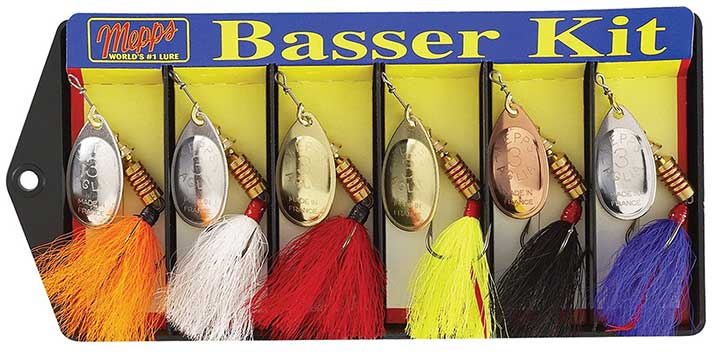
One of the most fun things about fishing is getting to try new lures and baits that help give anglers a greater advantage of catching more fish, or even the larger trophy fish that are so hard to land. For beginning anglers who are looking for new ways to increase their chances of hooking up on a fish, trying new lure presentations is something that can prove to be very productive.
For example, most anglers use things like inline spinners to catch freshwater species like trout or bass. This method is easier than fly fishing or using the larger baitcasting rod and reels that are common to bass fishing.
It’s important to do your research when it comes to fishing for any type of game fish species. This includes studying up on all the different types of lures and rigs that anglers use to catch that species. Once you’ve spent a good amount of time mastering one style of lure, work on trying out a new approach as this will expand your knowledge base and help you gain a better understanding of the fish and how to find better methods to catch them when they just won’t bite.
13. Fish the Spring and Fall
Fishing is a sport that can be enjoyed throughout the entire year. While most anglers will flock to lakes, rivers, and coastal areas during the late spring and early summer, you can actually experience quite a bit of success by fishing during the spring and fall when there are fewer people on the water.
These times of year are often very productive because the water temperature is changing and fish are becoming more active, often feeding up to prepare for the spawn in the spring, or gorging themselves in preparation for a long winter.
The cooler temperatures of the spring and fall are another reason why anglers love to fish during these seasons. You really can’t go wrong by fishing during this time as you’ll be able to avoid the heat or freezing temperatures and take advantage of the unique change in water temperatures on any body of water.
14 Check Fishing Reports in the Area.
Fishing is an activity that requires continual research and learning in order to truly become a master at it. No matter how long an experienced angler has been fishing, they can always make use of the fishing reports in their area. This is another great tip for beginners that will go a long way in helping you understand where the fish are, as well as what they are eating.
With the Digital Age, it’s been increasingly easy to find localized fishing reports as one need only to search for it on the various website search engines that are available on the internet. Doing your research before a fishing trip will help you prepare by getting the right kind of lures ready, as well as having a good idea of where to fish on a given body of water.
15.Watch Youtube videos
Thanks to the internet, we now have endless amounts of information that will help anglers of all skill levels to have a successful outing any time of the year. One of the best tips for beginning anglers is to watch plenty of Youtube videos on the particular type of game fish species you’re going after, or the specific location you plan to fish. Captain Cody from Global Fishing reports has a youtube channel that helps teach anglers how to fish.
This is a major advantage that fishing enthusiasts a few generations ago would have never dreamed possible. Watching Youtube videos will help you understand anything about fishing from what kind of line to use to the right way to rig and use a specific kind of lure or setup.
16. Ask a Friend to Teach You to Fish
There’s nothing quite like having someone show you all the finer points of any new hobby. This is especially true when it comes to fishing as anglers can benefit greatly from simply going fishing with a more experienced friend or acquaintance.
Getting a friend to take you fishing is likely the best teaching tool you can have since you’ll be able to have one-on-one time with someone who has already been fishing for years in most cases and can truly show you the ropes when it comes to fishing with a specific type of lure, or even finding the best areas to catch various species.
This also pays off in more ways than one because there’s nothing more enjoyable than spending some time on the water with a friend, especially when the fish are biting. When you do go fishing with a more experienced friend, be sure to ask plenty of questions as this is a chance for you to gain a large amount of understanding in a sport that is always changing and evolving.
Fishing with an older relative is also a great way to learn the sport. Most of the world’s greatest anglers learned how to fish by going on many different trips with their fathers or other relatives who are willing to patiently teach them how to fish. Once you’ve been fishing for any number of years, you’ll be able to pass on your own knowledge and expertise to someone else who might be new to the sport.
17. Book and Fishing Charter or Hire a Guide
Fishing can sometimes be an expensive sport to get your feet wet in, but if you’re not on a very tight budget, it can be very beneficial to invest your money in hiring a fishing guide. There are plenty of fishing guides and charters out there who are willing to take you fishing so long as you’re able to pay their rates. This is arguably one of the best ways to learn how to catch a new species of fish, or even improve your own fishing ability, regardless of how many years you have on the water.
Hiring a fishing guide is a great way to understand the finer points of how to fish at different times of the year, or to just go out and have a great time on the water. Most fishing guides are experts in their field and are more than willing to answer questions and teach newcomers plenty of tips and tricks that will help them along the way.
18. Learn What Fish Can be Kept For Dinner
Fishing is one of the most enjoyable outdoor sports on the planet for a number of reasons. Many would argue that the most rewarding thing about spending a day out on the water is the chance to go home with plenty of fish that you can cook for dinner. Any experienced angler will agree that there’s nothing quite as delicious as fresh-caught fish.
Some fish are not as suitable for cooking and eating as others, so it’s important to learn which species will make the best table fare. There are endless numbers of resources online that will help in figuring out how to properly clean and filet each fish, as well as various recipes for each particular species.
19. Catch Bait with Cast Nets or Traps, It is Lots of fun!
As we’ve already noted before, the best bait for beginning anglers is often live bait. This can usually be purchased at any number of local stores near a particular body of water, but the best type of live bait is that which you actually catch yourself.
Catching your own live bait ensures that you will be able to use bait that is as fresh as possible, as well as presenting the fish with the type of meal they’re already accustomed to eating. You can catch various types of baitfish with a trap or cast net, especially around coastal areas.
Catching your own bait might seem like a waste of time when you can simply buy some live bait at the local stores, but experienced anglers all agree that using fresh-caught bait will present you with the greatest advantage to catching fish on any body of water. It also won’t take long for you to realize that it can be as much fun to catch your own bait as it can be to fish with a full-size rod and reel.
20. Combine fishing with Hiking and Camping
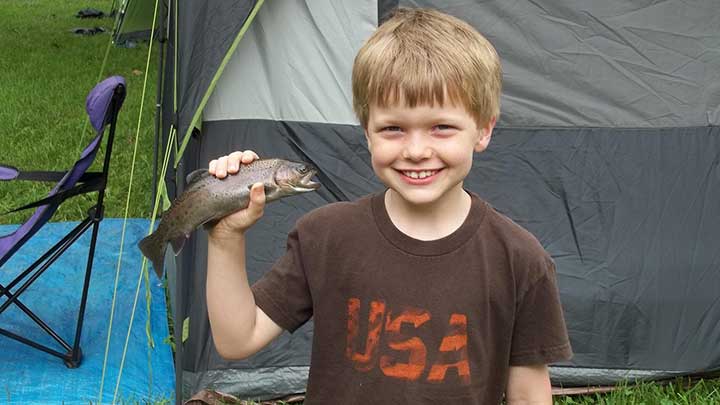
Fishing is a sport that can be enjoyed literally anywhere you can find a body of water. It’s always fun to visit your local fishing hole, which might be a lake or stream not far from home, but there is a great amount of adventure to be had when you make an extended trip out of your outing.
Going fishing on a long trip is arguably the most fun way to enjoy the sport as you’ll be able to truly experience a greater degree of nature’s beauty that most people don’t get to experience. Try going on a hiking trip and take along your fishing tackle in a backpack and you’ll understand why so many anglers spend weeks out of each year in pursuit of the most remote fishing locations in the world.
There’s also nothing quite like taking a camping trip with friends and enjoying a few days on the water as you all spend the day catching fish and enjoying one another’s company only to come back to camp to clean and cook your day’s catch. Once you get into the sport of fishing, you’ll quickly understand why so many people enjoy this unique pastime.
Captain Cody has worked on charter fishing boats in the Florida Keys, Virgin Islands, and Alaska. Growing up in Pennsylvania Cody has also done extensive freshwater fishing including bass fishing tournaments. Cody strives to provide detailed information about the best fishing gear and tactics to help both novice and experienced anglers have a more productive and enjoyable time on the water. Cody also has a background in aerospace engineering and neuroscience but really only takes pride in being good at one thing and that is fishing!
